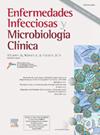Anticipating the side effects of benznidazole: HLA-B*35 and patch test
IF 2.6
4区 医学
Q3 INFECTIOUS DISEASES
Enfermedades infecciosas y microbiologia clinica
Pub Date : 2024-10-01
DOI:10.1016/j.eimc.2024.04.006
引用次数: 0
Abstract
Introduction
Treatment of Chagas disease frequently causes distress to patients due to a high incidence of adverse effects. Different preemptive tests have been researched to prevent these effects and to allow focus to be given to certain predisposed patients. Benznidazole is the most prescribed Chagas disease treatment in Spain.
In this work, we analyzed the genetic markers HLA-B*35 allele group and HLA-B*35:05 allele specifically, as well as an allergy patch test, as benznidazole's most frequent adverse effects are cutaneous.
Methods
HLA-B intermediate-resolution genotyping was performed followed by a high-resolution level analysis. Cutaneous allergies were tested using strips impregnated with a mixture of benznidazole and placed on the upper back of patients before starting treatment.
Results
In our sample of more than 400 patients, there was almost no relationship between any kind of side effect and either of the HLA-B alleles studied. The patch testing was quickly discarded as a preemptive test due to its low sensitivity (16.7%).
Conclusion
In conclusion, we were unable to replicate and corroborate genetic markers identified by other groups and there is currently no test that can anticipate the adverse effects of benznidazole, therefore, more investigation should be carried out in this field.
预测苯并咪唑的副作用:HLA-B*35 和斑贴试验
导言恰加斯病的治疗由于不良反应发生率高,经常给患者带来痛苦。为了防止这些不良反应,并使某些易感患者得到重点治疗,人们研究了不同的预防性试验。在这项工作中,我们分析了遗传标记 HLA-B*35 等位基因组和 HLA-B*35:05 等位基因,并进行了过敏贴片测试,因为苯并咪唑最常见的不良反应是皮肤过敏。结果 在我们抽取的 400 多名患者中,任何一种副作用与所研究的 HLA-B 等位基因之间几乎都没有关系。由于贴片测试的灵敏度较低(16.7%),因此很快就被放弃作为一种预防性测试方法。
本文章由计算机程序翻译,如有差异,请以英文原文为准。
求助全文
约1分钟内获得全文
求助全文
来源期刊
CiteScore
2.10
自引率
8.00%
发文量
194
审稿时长
29 days
期刊介绍:
Hoy está universalmente reconocida la renovada y creciente importancia de la patología infecciosa: aparición de nuevos agentes patógenos, de cepas resistentes, de procesos con expresión clínica hasta ahora desconocida, de cuadros de una gran complejidad. Paralelamente, la Microbiología y la Infectología Clínicas han experimentado un gran desarrollo como respuesta al reto planteado por la actual patología infecciosa. Enfermedades Infecciosas y Microbiología Clínica es la Publicación Oficial de la Sociedad Española SEIMC. Cumple con la garantía científica de esta Sociedad, la doble función de difundir trabajos de investigación, tanto clínicos como microbiológicos, referidos a la patología infecciosa, y contribuye a la formación continuada de los interesados en aquella patología mediante artículos orientados a ese fin y elaborados por autores de la mayor calificación invitados por la revista.

 求助内容:
求助内容: 应助结果提醒方式:
应助结果提醒方式:


